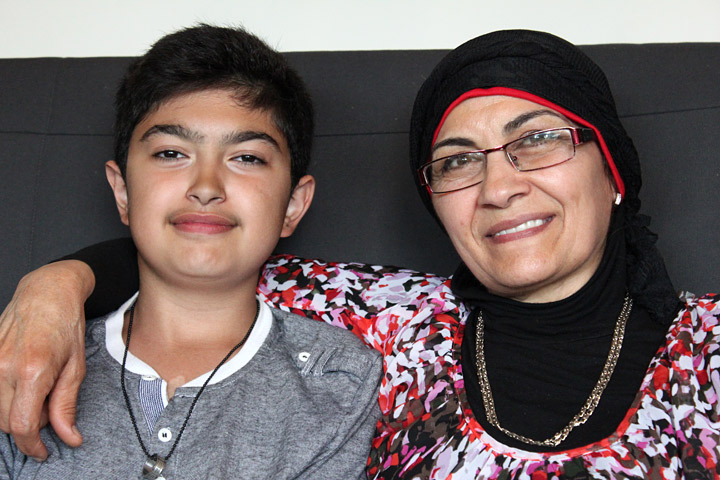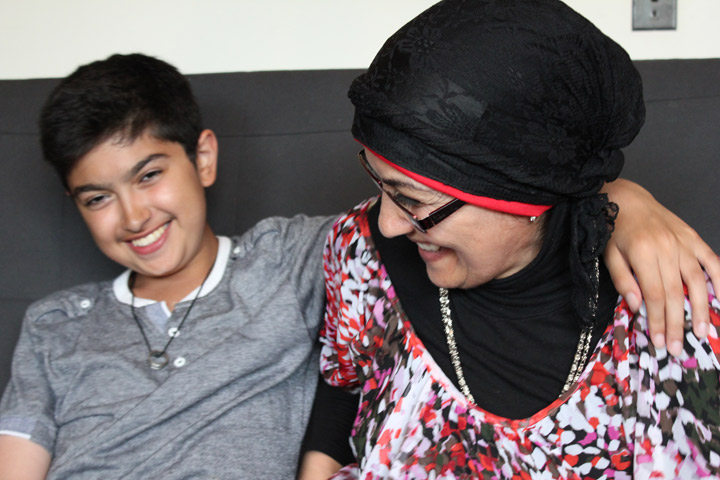In the eyes of the Canadian government, Sana Hassan and her son Omar are “bogus” refugee claimants.

But they can’t be deported to Iraq, because Iraq is too dangerous.
So they’ve been living here in limbo for seven years – unable to put down proper roots and living in fear of deportation should the situation in Iraq improve.
Further complicating things is Omar’s heart: He was born with a complex congenital heart disease, including a septal defect and transposed arteries.
“It’s like when you’re at church, everyone is like this,” he explains in an interview, placing his right hand over the left side of his chest, “and I’m like this,” switching hands so his left hand rests over his right side.
Even after multiple surgeries, he needs serious medical care – care Ottawa’s refugee health care cuts would have denied him had it not been for SickKids Hospital’s generosity, and the Ontario government’s intercession.
Those federal cuts were struck down by a federal court Friday: A ruling deemed them “cruel and unusual punishment” targeting those most vulnerable.
That doesn’t help Hassan’s legal status, however.
Ottawa sees no contradiction: Refugee claims are based on individual risk; the suspension of deportations is based on a generalized risk to the entire civilian population of a foreign country, wrote the Canada Border Services Agency in an emailed statement.
That’s little comfort when you’re trying to make a life for yourself and your son.
“What do I do?” Sana Hassan asks in an interview. “I’m really trying and hoping that I can stay in this country.”
‘Deportation would probably be life-threatening’
Hassan left Iraq in 2006, with a very sick five-year-old in tow. Omar needed major surgery.
Iraqi specialists warned Hassan that if Omar’s surgery was performed in Iraq, he might not survive. They recommended she go abroad, where medical care was better.
She applied to the United Nations, and eventually received permission to go with her son to the United States. The surgery was successfully performed in Washington, but Hassan was still worried. Some doctors told her that he might need another surgery, and she noticed that Omar was still weak when exerting himself.
So she contacted some friends of her husband’s cousin in Mississauga, who suggested she come to Canada because she might be able to become a refugee.
She made her way to the Windsor-Detroit border and arrived in Toronto with the help of Freedom House, an American organization that shelters asylum-seekers.
She made a refugee claim on the grounds that as a Sunni Muslim, she was in danger due to a conflict with her Shia neighbours, and was denied: Officials doubted her story, finding her testimony not “credible or trustworthy” and determining that there was no specific risk to her and her family were she to return to Iraq.
Hassan also applied for permanent residency to remain in Canada on humanitarian and compassionate grounds, she says, but that application was rejected in 2012. She says it was because she was on welfare – Omar required so much care, she says, that she wasn’t able to work full-time when she first arrived in Canada.
A letter written by Citizenship and Immigration Canada and sent to Hassan does not provide any details on why her application was rejected.
In a statement Friday, CIC said that they could not comment specifically on either the refugee claim or the humanitarian application.
So Hassan and Omar are stuck. Although their residency claims were rejected, Canada has not deported people to Iraq since 2003, according to CBSA, because of concerns regarding the violence there.
CBSA estimates there are 5,000 people in Hassan’s position.
So they get by: Hassan works in a convenience store, volunteers at a local mosque and at Omar’s old school and is looking for a second job.
Omar, now 13, is in Grade 7 at Queen Elizabeth Senior Public School in Mississauga.
He still needs regular checkups and multiple medications, one of which costs $1,000 a month, said Hassan.
These used to be covered by the federal government.
But in 2012, changes to Ottawa’s Interim Federal Health Program meant health care costs for failed refugee claimants like Omar were no longer paid for unless they were for conditions which posed a threat to public health.
This policy change was just ruled “cruel and unusual” treatment by the Federal Court.
And it could have been fatal for Omar: There’s no way his mom could cover his medical costs herself.
SickKids Hospital helped for a time, continuing to treat Omar and absorbing some of the cost of his care after the federal cuts. “We believe every child deserves equitable access to care and no child in Canada should be denied health care for lack of funding,” wrote the hospital in an emailed statement to Global News.
Then in December 2013, the Ontario government stepped up to cover what the federal government cut.
This was more than a humanitarian move, then-Health Minister Deb Matthews explained at the time: The lack of preventive care meant more people crowding emergency departments in dire health straits.
Chris Alexander, the current minister of Citizenship and Immigration, stated on Friday that the government will appeal the Federal Court’s decision to reverse the cuts. “We remain committed to putting the interests of Canadians and genuine refugees first. Failed claimants and those from safe countries like the US or Europe should not be entitled to better health care than Canadians receive,” he said.
In the meantime, Hassan said, Omar’s doctors “don’t know if he will be okay with his current heart or if he will need a transplant.”
The hospital told Canadian Border Services as much in a 2012 letter: “The life expectancy of his heart is unknown and he may require a heart transplant at some point in time,” it reads.
“Deportation would probably be life threatening for Omar,” concludes the letter, signed by Dr. Fraser Golding, a Heart Centre staff cardiologist. SickKids confirmed Friday that Omar is still in serious condition and requires “long-term specialized medical management that cannot be provided in Iraq.”
‘It’s like I’m fighting to survive.’
If Hassan and her son were sent back to Baghdad, there wouldn’t be much to return to.
Hassan’s husband and her two older sons left a few months after she did, after her husband Kanaan was shot at while driving home one evening. He hit the brakes as the attackers opened fire, she says, and somehow escaped unharmed.
Hassan attributes that shooting to ongoing sectarian tensions: The family is Sunni in Shiite-ruled Iraq, which has been riven by bloodshed as Sunni militants ISIS take over swaths of the country.
Hassan’s husband and two sons, Ali and Taha, fled to Syria in late 2006, then to Turkey. They currently live to the south of Ankara.
But life is not peaceful for them there either. Ali, 23, was recently stabbed in the leg (his mother has no idea why). Taha, 21, works as a translator.
But the United Nations High Commission on Refugees accepted Kanaan’s refugee claim early in 2014, and decided he should go to Canada.
The bad news is, the couple’s oldest sons can’t be included in that claim.
But the good news is, Hassan and Omar could be.
Years after arriving in Canada, having their claim denied and living in limbo, Hassan and her son could finally achieve legal status through her husband, according to Tanya Aberman, a research and project coordinator at the Faithful Companions of Jesus (FCJ) Refugee Centre in Toronto, who has been helping Hassan with her case.
Because Kanaan has been accepted already through the UN, Hassan and Omar could also gain status through family reunification – attaching their claims to his.
It isn’t clear how soon Kanaan could arrive, Hassan says.
Until then, “my life is very difficult here. It’s like I’m fighting to survive.”
Photo: After waiting patiently through the interview, Omar Kanaan requested to borrow Global News’ camera to take a selfie. This is the result.
EDIT: Story edited July 8, 2014 to add SickKids Hospital’s comments.





Comments